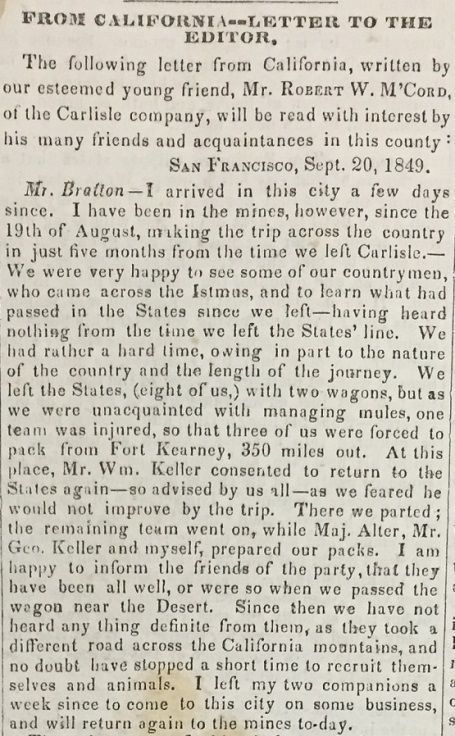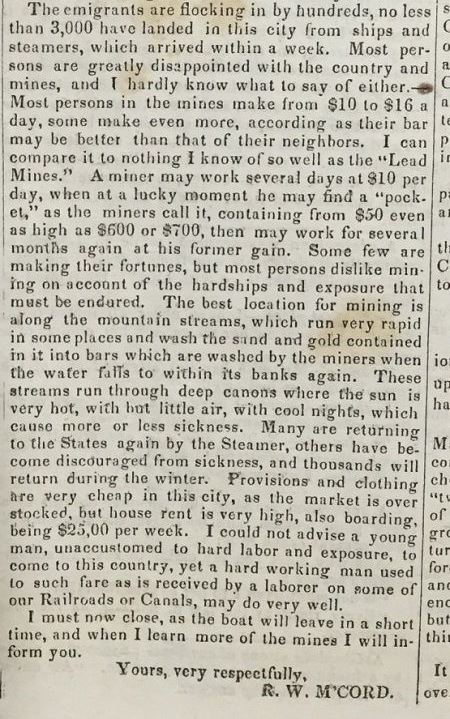Robert W. McCord was in his senior year at Dickinson College in 1849 when former Carlisle newspaper editor, George Fleming, formed a party of men to head to the gold fields in California. With thoughts of adventure, McCord dropped out of college and joined them. He would die within ten years and lay buried in John Sutter’s cemetery in California.
McCord left Carlisle on March 22, 1849 with J. M. Kneedler and J. A. Bishop. They planned to go to Pittsburgh to meet George Fleming’s group who had left Carlisle the week before. From there, they would all travel to Missouri and join a wagon train to make the overland trip to California. They traveled together until they reached Fort Kearny in Nebraska when the group split in two.
McCord gave details of the journey in a letter he wrote in San Francisco on September 29, 1849 and sent to the editor of Carlisle’s American Volunteer newspaper.
“Mr. Bratton—I arrived in this city a few days since. I have been in the mines, however, since the 19th of August, making the trip across the country in just five months from the time we left Carlisle. We were very happy to see some of our countrymen, who came across the Istmus, [sic] and to learn what had passed in the States since we left—having heard nothing from the time we left the States’ line. We had a rather hard time, owing in part to the nature of the country and the length of the journey. We left the States (eight of us) with two wagons, but as we were unacquainted with managing mules, one team was injured, so that three of us were forced to pack from Fort Kearney, 350 miles out. At this place, William Keller consented to return to the States again—so advised by us all—as we feared he would not improve by the trip. There we parted; the remaining team went on, while Maj. Alter, Mr. Geo. Keller and myself prepared our packs. I am happy to inform the friends of the party, that they have been all well, or were so when we passed the wagon near the Desert. Since then we have not heard anything definite from them, as they took a different road across the California mountains and no doubt have stopped a short time to recruit themselves and animals. I left my two companions a week since to come to this city on some business, and will return to the mines today.” 1
McCord’s letter also reported on the hundreds of men landing in San Francisco and the hardships of mining and the miners.
The editor of the American Volunteer published further information about McCord in July 1850:
“Letter From California.—We are pleased to learn, a few days since, that a letter had been received in this place from our esteemed young friend, Mr. Robert W. McCord, who it will be recollected, left Carlisle last March a year. He had not been heard from for a long time, and his friends here felt much anxiety concerning him. The letter received is dated ‘Rattle Snake Bar, April 30, 1850.’ He gives a very satisfactory and vivid account of the privations and hardships he has had to encounter. He had finally settled down, however, at the place he dates his letter, and, at the time of writing, was in excellent health and spirits, and, we should think, doing well. He expects to return home in December next. His many friends will be rejoiced to welcome him to Carlisle. He is a young man of great energy of character, and deserves, as we hope he may receive, a good reward for his perseverance and labor in California.”2
It is not known if he returned to Carlisle to visit his friends and family, but, if he did, he returned to California. The March 14, 1859 edition of the Sacramento Daily Union reported: “Died in Sacramento, March 12, Robert W. McCord, a native of Pennsylvania, aged 32 years.” According to California vital records, McCord died on March 11, 1859 of chronic bronchitis and was buried in New Helvetia Cemetery in Sacramento.3 The cemetery, the first in Sacramento, was established by Capt. John Sutter in 1849.


